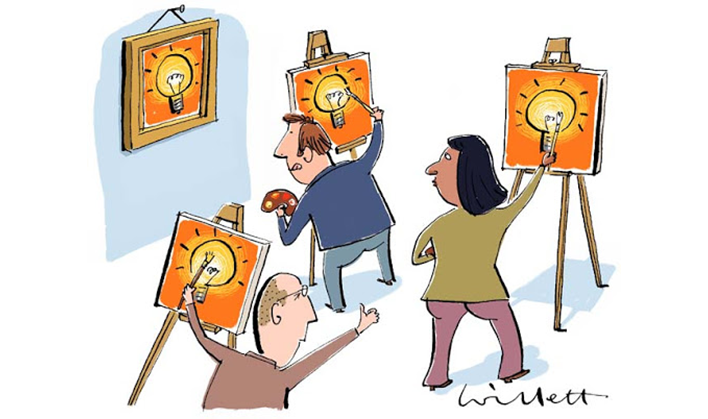Last week I had some interesting conversations with two colleagues, each one of them offering me a new perspective.
The first one spoke of how her/his ideas are often copied by others, or rather stolen and then projected as their own. But copycats, she/he went on to say, never get the depth of originality, do they? They can only steal the thoughts, but it all becomes so superficial…
My second friend mentioned her/his passion of sharing knowledge. This person completely believes that knowledge is meant to be shared. Whatever we have learnt today, it is because someone has been gracious enough to share that knowledge and know-how with the world.
I could sense both were right in their own ways. The second conversation got me thinking about how we get to learn and know of things…whatever we are taught is because someone has taken the trouble to share that somewhere. Take medicines for example. Once a patent expires, the knowledge and technology are open for anyone who wishes to manufacture a generic. Another example could be a particular hobby that you are very passionate about – if it is gardening, your passion will make you learn everything there is about it. You are likely to scan social media, Instagram posts of avid gardeners who openly share tips and tricks on keeping plants healthy.
The pandemic has been the greatest example of showcasing the benefits of sharing. In almost all the WhatsApp groups of which I am a part of, someone is helping someone with information and resources. Then there is someone who is verifying the humungous data present out there so that someone else does not waste time. Now imagine, not having access to such vital information in these pressing times…we would all be poor and bereft of humanity itself.
We all ask for examples, success stories, templates, what has worked, what has not…and yes, sometimes, we do not want to share. This happens when that ugly noise in a corner of our mind, rears its head and says – ‘I have done all the hard work so, why I should give it away?’ Sounds familiar does it not? Then I go back to my first conversation and realize that it does not matter – the copycat will never be able to reproduce the original.
How do then make that information new and worthwhile? Whenever we learn something different or receive information from others, it is always worthwhile to give it our own unique flavor and color! That also helps us showcase our own skills and competencies
Some tips:
When you receive an input that is helpful, do your own research to enhance your understanding of the subject. Do not copy blindly.
Keep your organisation’s culture at the center of how you communicate, the messaging you develop and the framework you work on. What has worked for someone else will not necessarily work for you.
Do not underplay reverse mentoring. Youngsters of today are savvier and more knowledgeable in certain subjects that we may be out of depth in. Social media and technology are two great examples here. As a communicator if you are designing your social media strategy and someone in your network has given you the framework, just pause. Instead of copying it blindly, ask the millennials for their insights and tips! You would be surprised at the outcome.
Seek help when stuck! Do not allow your ego to overshadow your quest for knowledge. Remember when at school how we would always ask our teacher for clarification? Be a student for life and seek your clarifications.
Allow curiosity to get the better of you. Follow influencers and understand what makes them stand apart. Observe how people fuel their passion.
In the end, it does not matter whether you copy an idea or use the knowledge someone graciously shared with you…what matters is that you create something original out of it and of course, give back generously. Keep expanding the circle of knowledge.
The views and opinions published here belong to the author and do not necessarily reflect the views and opinions of the publisher.



Be the first to comment on "Copycat, copycat!"